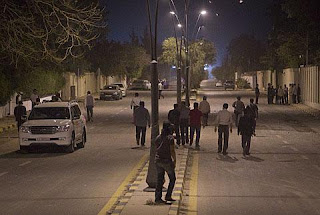The eastern part of HCM
City has been transforming rapidly thanks to several key transport
projects and new modern urban areas with high rises that are springing
up along the Saigon River.
The East-West Highway, which was given the
name of former Prime Minister Vo Van Kiet last week, was partially
completed last year and acts as an artery for the city, facilitating
traffic between the downtown and outlying areas and, thus, their
development.
When the Thu Thiem Tunnel under the Sai Gon River is opened in the middle of this year, the 20 kilometer, six – to eight-lane highway will be completed.
Beginning from National Highway 1A in Binh Chanh District in the west, it will run through districts 6,5,4,1, and 2 to link up with the Ha Noi Highway, allowing traffic from Sai Gon Port to the Cuu Long (Mekong) Delta and southeastern provinces to bypass the city centre.
Another strategic structure, the Phu My Bridge, connects districts 7 and 2 across the Sai Gon River, easing cargo transport to and from Cat Lai Port and traffic between southeastern provinces like Ba Ria-Vung Tau, Dong Nai and Binh Duong and the Cuu Long Delta without the need to go around on Highway 1A.
This bridge also helps shorten the District 2-District 7 route by 10km.
Between 2005 and 2010, around 210km of new roads and 50 bridges have been built in addition to the upgrade done to the Nguyen Van Troi-Nam Ky Khoi Nghia axle and Thu Thiem Bridge.
Under a Ministry of Transport development strategy, by 2020 ring roads and expressways will be built to inter-link the Southern Key Economic Region including HCM City, Tay Ninh, Binh Duong, Dong Nai and Ba Ria-Vung Tau.
According to the My Thuan Managing Board, a major MoT agency that develops transport infrastructure in the south, it has reported to the ministry about building Ring Road 3 this year.
The 89km road will run through HCM City (49 km) and Dong Nai, Binh Duong and Long An provinces. The ministry also planned to start work on the 58km Ben Luc – Long Thanh Expressway from Long An to Dong Nai through HCM City in 2012, the board said.
Work will continue on some 20 major projects in the city.
When the Thu Thiem Tunnel under the Sai Gon River is opened in the middle of this year, the 20 kilometer, six – to eight-lane highway will be completed.
Beginning from National Highway 1A in Binh Chanh District in the west, it will run through districts 6,5,4,1, and 2 to link up with the Ha Noi Highway, allowing traffic from Sai Gon Port to the Cuu Long (Mekong) Delta and southeastern provinces to bypass the city centre.
Another strategic structure, the Phu My Bridge, connects districts 7 and 2 across the Sai Gon River, easing cargo transport to and from Cat Lai Port and traffic between southeastern provinces like Ba Ria-Vung Tau, Dong Nai and Binh Duong and the Cuu Long Delta without the need to go around on Highway 1A.
This bridge also helps shorten the District 2-District 7 route by 10km.
Between 2005 and 2010, around 210km of new roads and 50 bridges have been built in addition to the upgrade done to the Nguyen Van Troi-Nam Ky Khoi Nghia axle and Thu Thiem Bridge.
Under a Ministry of Transport development strategy, by 2020 ring roads and expressways will be built to inter-link the Southern Key Economic Region including HCM City, Tay Ninh, Binh Duong, Dong Nai and Ba Ria-Vung Tau.
According to the My Thuan Managing Board, a major MoT agency that develops transport infrastructure in the south, it has reported to the ministry about building Ring Road 3 this year.
The 89km road will run through HCM City (49 km) and Dong Nai, Binh Duong and Long An provinces. The ministry also planned to start work on the 58km Ben Luc – Long Thanh Expressway from Long An to Dong Nai through HCM City in 2012, the board said.
Work will continue on some 20 major projects in the city.
aseanaffairs


 9:31 PM
9:31 PM
 Trung
Trung

 Posted in:
Posted in: 




















